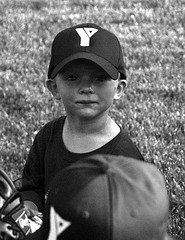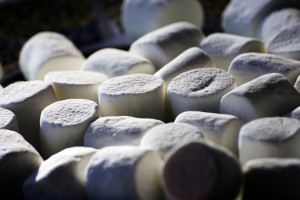Some kids seem to sail through life’s ups and downs without too much effort. When crappy stuff comes their way, they pick themselves up, maybe cry a few tears and slap on a couple of bandaids, then they keep on going.
Other kids, not so much. When faced with stress or adversity, no matter how big or small, kids in this group tend to falter. Can’t cope. Their grades suffer. Friendships languish. Maybe they have trouble sleeping or eating. Perhaps they get a lot of headaches or stomachaches.
Experts have tried to predict the things that make any individual more likely to fall in the first group — the resilient group — than the second one. I’ve written about resilience here a number of times (see here and here for two recent examples), and it’s pretty clear that it’s a complex topic. Last week, I wrote about the way in which control fits into resilience, and referenced the famous “marshmellow experiment.”
After reading that post, a colleague sent me a link to an interesting New York Times Magazine article called “What if the Secret to Success is Failure?” In this long, sometimes tedious piece, the principals of some New York City area schools experiment with different character-building programs in order to boost long term achievement. It turns out that IQ scores alone aren’t very good predictors of who will go on to college, who will actually finish their degrees.
We know that character is one of the 7 C’s of resilience, according to the American Academy of Pediatrics. But it’s always been notoriously difficult to measure. That is, until a professor named Angela Duckworth, then a doctoral student, sought some way to make sense of the qualities that go beyond IQ: “People who accomplished great things, she noticed, often combined a passion for a single mission with an unswerving dedication to achieve that mission, whatever the obstacles and however long it might take. ” (New York Times Magazine, Sept. 14, 2011).
She named this quality “grit” and came up with a scale for measuring it. It’s deceptively simple, only takes a few minutes to fill out, and relies on the usually notoriously unreliable method of self-reporting. But when she tested it, she found that it was powerfully predictive of success. She tested it on college students and found that those who scored high on the Grit Scale had higher GPA’s, even if they initially had lower college board tests. She tested it on West Point cadets, and it turned out to be the most accurate predictor of who finished the grueling program.
When they tested students in elementary and high schools, they found that while IQ scores predicted scores on government achievement tests, the Grit Scale was the better predictor of report card grades. Makes sense, since those latter grades include finishing homework projects, in-class participation and behaviour. And that has a lot more to do with self-control and character.
How well would your child do on the Grit Scale? Before you take the test with them, consider that it might be most helpfully read as a rubric of skills you want to help your child develop. A low grit score does not spell the death knell for your child’s aspirations! This scale is used by schools to help build on those areas of weakness. You can improve their self-control, their self-discipline, etc. So take the final number with a grain of salt and see it as an opportunity.
Directions for taking the Grit Scale: Please respond to the following 8 items. Be honest – there are no right or wrong answers!
1. New ideas and projects sometimes distract me from previous ones.*
Very much like me
Mostly like me
Somewhat like me
Not much like me
Not like me at all
2. Setbacks don’t discourage me.
Very much like me
Mostly like me
Somewhat like me
Not much like me
Not like me at all
3. I have been obsessed with a certain idea or project for a short time but later lost interest.*
Very much like me
Mostly like me
Somewhat like me
Not much like me
Not like me at all
4. I am a hard worker.
Very much like me
Mostly like me
Somewhat like me
Not much like me
Not like me at all
5. I often set a goal but later choose to pursue a different one.*
Very much like me
Mostly like me
Somewhat like me
Not much like me
Not like me at all
6. I have difficulty maintaining my focus on projects that take more than a few months to complete.*
Very much like me
Mostly like me
Somewhat like me
Not much like me
Not like me at all
7. I finish whatever I begin.
Very much like me
Mostly like me
Somewhat like me
Not much like me
Not like me at all
8. I am diligent.
Very much like me
Mostly like me
Somewhat like me
Not much like me
Not like me at all
Scoring:
1. For questions 2, 4, 7 and 8 assign the following points:
5 = Very much like me
4 = Mostly like me
3 = Somewhat like me
2 = Not much like me
1 = Not like me at all
2. For questions 1, 3, 5 and 6 assign the following points:
1 = Very much like me
2 = Mostly like me
3 = Somewhat like me
4 = Not much like me
5 = Not like me at all
Add up all the points and divide by 8. The maximum score on this scale is 5 (extremely gritty), and the lowest score on this scale is 1 (not at all gritty).
Grit Scale citation:
Duckworth, A.L, & Quinn, P.D. (2009). Development and validation of the Short Grit Scale (Grit-S). Journal of Personality Assessment, 91, 166-174. http://www.sas.upenn.edu/~duckwort/images/Duckworth%20and%20Quinn.pdf
Duckworth, A.L., Peterson, C., Matthews, M.D., & Kelly, D.R. (2007). Grit: Perseverance and passion for long-term goals. Journal of Personality and Social Psychology, 9, 1087-1101. http://www.sas.upenn.edu/~duckwort/images/Grit%20JPSP.pdf



